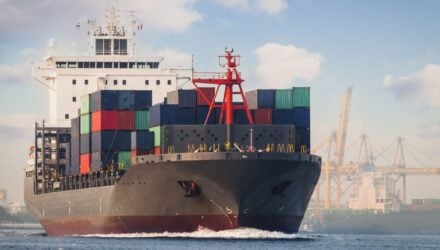The boom in e-commerce throughout the pandemic has significantly increased the environmental impact of businesses supply chains. Recent research found that 34% of retailers experienced an upsurge in usage for already stretched warehousing resources, while 67% saw an increase in transport requirements, as customers demanded faster at-home deliveries.
With environmental concerns at an all time high, with the UK government pledging to meet net-zero by 2050, as well as pressure to meet increasing customer service expectations, many organisations have also experienced consumer and stakeholder pressure to improve their sustainability credentials and reduce their supply chain’s carbon footprint. According to recent research, 73% of consumers are willing to change their e-commerce habits to reduce their environmental impact, and a third of consumers admit to avoiding purchasing from certain brands due to ethical and sustainability concerns.
Therefore to make sustainable changes to the supply chain and avoid potential loss of custom and/or reputational damage, businesses must look beyond their day-to-day carbon emissions and consider the larger impact that their supply chain is having on their business’s total carbon footprint. But this isn’t always being done. Whilst 90% of UK business’s carbon footprints are generated through their supply chain, recent research that surveyed business leaders, across grocery and homeware industries, found that nearly half of all organisations (40%) do not have a sustainability strategy in place at all – let alone one focusing on their supply chain.
 So how can organisation’s go about this? Well, as vehicles make up 21% of global carbon emissions, tackling transport is a good place to start in reducing the overall carbon footprint of supply chains. As such, businesses and fleet providers should work together to make meaningful changes to transport emissions this year to improve the sustainability of supply chains.
So how can organisation’s go about this? Well, as vehicles make up 21% of global carbon emissions, tackling transport is a good place to start in reducing the overall carbon footprint of supply chains. As such, businesses and fleet providers should work together to make meaningful changes to transport emissions this year to improve the sustainability of supply chains.
With this in mind, let’s discuss some of the changes that businesses can make to improve the sustainability of their supply chains, particularly when it comes to their transport provisions.
Collaboration between businesses and fleet providers
If meaningful, long-term improvements to the carbon footprint of supply chains are to be made, more collaboration needs to take place between businesses and their fleet providers. There should be a representative from the fleet provider present at business leadership meetings who possesses the knowledge and expertise to advise on sustainable changes. This means the concerns of both the business and the fleet company are taken into consideration during the decision making process.
Invest in an e-fleet
The benefits of electric vehicles (EVs) is evident across the world with research predicting that by 2025, 30% of all vehicle sales will be hybrid or EVs. There are already some companies using EVs for short-distance journeys with measurable benefits to their carbon emissions. For example, Waitrose has developed a fleet of EVs with wireless charging technology. This move from the retailer is a promising step towards greener supply chains, as committing to completing all short distance deliveries with EVs will make substantial improvements.
Optimise existing fleets
Fleets can also be optimised to reduce their associated carbon emissions. This can be achieved most effectively by reviewing, planning and utilisation. Operators should be monitoring whether vehicles are being filled, running empty miles and if they are being fully utilised. Reviewing these factors often can take unnecessary vehicles off the road and reduce fleet numbers.
In addition, when purchasing new vehicles, businesses should be investing in new technology that can reduce consumption and carbon emissions of their vehicles. Driver engagement is key and in-cab technology and telematics to inform and encourage optimum driving style can improve fuel economy by 10%. Investing in aerodynamic designs and new tyres can substantially improve fuel consumption, with fuel-efficient tyres being able to save 6% of fuel. Keeping fuel consumption at a manageable level will keep total energy usage and carbon emissions low.
Tackling new challenges that lie ahead
Improving supply chain sustainability will not be without challenge and it will be largely affected by external problems facing the UK throughout 2022. However, focusing on a business’s vehicles, whether these are those used by employees or used to transport products across the country, is likely to have a major impact on an organisation’s carbon footprint, making it an effective area to focus on.
Rising costs of energy, stock, and wages will likely result in many businesses looking for ways to keep costs low, which may come in the form of ignoring costly sustainable improvements to their supply chain. However, sustainability is important regardless of cost. In fact, having a greener supply chain could reduce costs further down the line, with a recent study finding that more than 8,500 companies in 34 market sectors that implemented sustainability changes in their supply chain had improved bottom lines.
If businesses are to retain custom and improve their carbon footprint across the whole company, this year, the focus needs to shift to the supply chain to make some meaningful improvements to businesses’ carbon emissions, and transport is a great place to start.
Author: Rob Wright, executive director at SCALA Consulting







